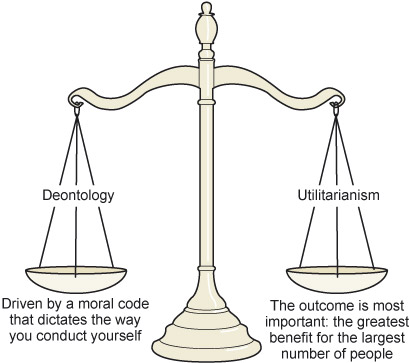4.1 Ethics in the supply chain
So what are ethics and what does it mean to behave ethically? This may seem like a strange question, but there are different views on this.
There are multiple theories on ethics but we will touch on just two here: deontological ethics and utilitarian ethics as shown in Figure 7. To fully understand these two views would take dedicated study, but in a nutshell (and with a great degree of simplification) they are defined as follows:
- Deontologists believe that organisations should follow certain principles, no matter what the consequences. These include honesty and the treatment of people as an end in themselves rather than a tool to be used. Developed by Immanuel Kant in the eighteenth century, this ethical approach focuses on an individual following a moral obligation over a natural instinct, referred to by Kant as ‘the categorical imperative’. The focus of this ethical approach is everyday conduct rather than consequences.
- Utilitarians believe that the consequences of one’s actions are the important thing, and that organisations should work to deliver the greatest benefit to the greatest number of people. This approach can lead to a dispassionate evaluation of actions, comparing the number of people that benefit with the number of people who might suffer as a result of any actions. The focus is on the ultimate outcome rather than the conduct that leads to the actions.
We will use these two definitions to explore some areas to consider in the supply chain environment.
Let’s have a look how these two definitions work in practice.

